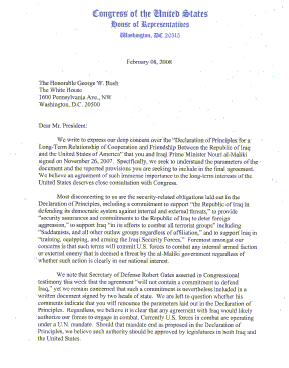The “status of forces” agreement currently being worked out between the Bush Administration and the Iraqi government behind closed doors has a lot of Democrats and war opponents concerned. Despite assurances from Defense Secretary Gates that any agreement “will not contain a commitment to defend Iraq and neither will any strategic framework agreement” and that they “do not want, nor will we seek, permanent bases in Iraq”… well, let’s just say nobody’s ready to buy those kinds of assurances from Bushco anymore.
Rep. Peter Welch has joined with 19 of his colleagues to try and raise the profile of the issue and sound warning bells about some early indications that the final product, in fact, may not be consistent with Gates’s testimony (imagine that!). From the letter:
Most disconcerting to us are the security-related obligations laid out in the Declaration of Principles, including a commitment to support “the Republic of Iraq in defending its democratic system against internal and external threats,” to provide “security assurances and commitments to the Republic of Iraq to deter foreign aggression,” to support Iraq “in its efforts to combat all terrorist groups” including “Saddamists, and all other outlaw groups regardless of affiliation,” and to support Iraq in “training, equipping, and arming the Iraqi Security Forces.” Foremost amongst our concerns is that such terms will commit U.S. forces to combat any internal armed faction or external enemy that is deemed a threat by the al-Maliki government regardless of whether such action is clearly in our national interest.
Also a matter of concern are indications that this agreement will further codify the immunities enjoyed by civilian contractors such as Blackwater, who have most recently been fingered for using chemical agents on Iraqi civilians and US troops in order to clear traffic for themselves. |
 |
The current US presence in Iraq is ostensibly under a United Nations mandate. It’s a fig leaf, obviously, but the Bush Administration is making moves to toss the fig leaf entirely and more directly, formally and intimately entangle the US with the Iraqi government (such as it is). This raises eyebrows to be sure – especially since it would run counter to the oft-expressed will of the public to disengage, rather than more tightly bind ourselves to the Iraqi quagmire, but it also flies in the face of the administration’s song and dance that we are always on the cusp of “standing down as the Iraqis stand up.”
Such an agreement could also put the new, incoming President into a far stickier situation in regards to implementing his or her own Iraqi policy (which – come on – is probably the intent).
Rep. Rosa DeLauro of Connecticut introduced legislation in January to specifically demand that any such agreements be done in concert with Congress, and the bill has gathered 42 cosponsors. It’s currently been referred to the House Committees on Foreign Affairs and Armed Services. The bill would have to pass, not be blocked by the GOP in the Senate, not get vetoed and then not be ignored by Bush to be meaningful, of course. Long odds, to put it mildly. Still, if it came to a full-on battle, Congressional Dems may also be able to make a Constitutional argument on the Congressional power to enter into treaties under Article II before the Supreme Court. You know, the Supreme Court which Bush has been stacking…
But even under the best of circumstances, the way Article II has shaken out historically is not promising. In November, Bush military adviser General Douglas Lute remarked that “We don’t anticipate now that these negotiations will lead to the status of a formal treaty which would then bring us to formal negotiations or formal inputs from the Congress.” In other words: forget it, folks. If we wanna tie ourselves militarily and economically to Iraq in any way we please, we’re not gonna waste our time coming to you about it. In this particular case, Bush wouldn’t be ignoring Constitutional precedent, as it would seem that in historical practice and judicial interpretation, the Executive Branch has wide leeway on deciding what is and isn’t a treaty that it is obliged to get Senatorial approval on.
Unfortunately, that means this legislation is, at present, the only way to go.
Oy. It’s gonna be a long year.
